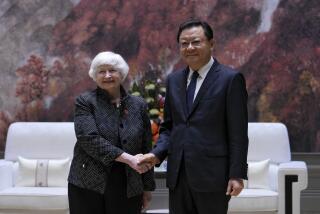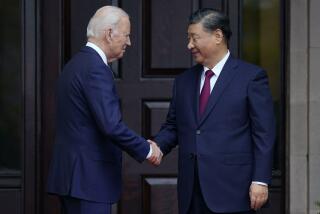Japan Draws Heat at U.S.-China Talks
- Share via
GUILIN, China — In the final days of President Clinton’s visit to China, his administration is exerting new pressure on Japan, making clear that it wants Tokyo to stimulate its economy within weeks and to stop making promises that aren’t fully carried out.
During the talks between U.S. and Chinese officials in Beijing, “there was great concern whether Japan will take the steps over the next couple of weeks that they said they will take,” a senior administration official told reporters.
“With each successive [Japanese] commitment that falls short of the mark, their credibility diminishes,” he declared.
The Clinton administration’s pointed remarks came as Japan unveiled a plan to resolve one of its most critical problems, a bad-loan crisis that threatens its banking system.
Over the last few months, as Asia’s economic crisis has continued to flounder, the administration has repeatedly urged the Japanese government to open the way for greater domestic spending to regenerate the region’s economy.
But the U.S. official’s new comments took on particular significance because of the very short time frame he gave and because his remarks questioning Tokyo’s trustworthiness were made on Chinese soil.
Clinton’s trip, which ends today, has been a sensitive subject in Japan. Administration officials decided that the president should spend a full eight days in China, the only country he is visiting. They rejected suggestions that he stop in Japan, which is America’s closest military ally in Asia.
The Clinton administration has made plain that the United States is coordinating its economic policies with those of China in hopes of easing the Asian economic crisis. Clinton brought Treasury Secretary Robert Rubin, the administration’s top economic policymaker, with him to Beijing. Rubin held his own separate talks with China’s Premier Zhu Rongji.
One of Clinton’s top aides said Asian security and economic issues together ranked at the very top of the list of issues in the Beijing talks. Second was weapons proliferation, and the third was human rights.
However, the aide, who spoke to a small group of reporters on condition that he not be named, said the administration isn’t favoring China over Japan--or over India, which the administration has condemned for its recent nuclear tests.
“We’re not playing China off against India, or India against China, or China against Japan,” he said. “These are inherent regional rivalries.”
Asian issues dominated the summit. Zhu raised the subject of Indonesia during his talks with the president, according to administration officials.
Zhu said the recent upheavals in Indonesia--where President Suharto was forced to give up power after more than three decades--demonstrated how the Asian economic crisis could lead to social instability.
* JAPAN UNVEILS PLAN: Japan offers long-awaited plan to end its economic woes. A1
More to Read
Sign up for Essential California
The most important California stories and recommendations in your inbox every morning.
You may occasionally receive promotional content from the Los Angeles Times.













